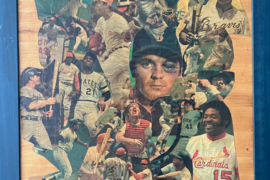I experienced my first heartbreak when I was nine years old. It wasn’t the passing of a relative, or any type of ill-fated puppy love. Rather, it was during the final two minutes of Super Bowl XLV between the Pittsburgh Steelers and the Green Bay Packers. This was the first year I had paid any attention to football. The Steelers had been my dad’s team since before he could remember, and, as most sons would, I inherited his admiration for them. It also helped that they were in the Super Bowl.
I remember the ending of that game rather clearly, though I’m sure it’s more perfect in my recollection than it actually was, as most memories are. The Steelers had the ball just ahead of the two-minute warning, down by six. For those that don’t know, the “two-minute warning” occurs when two minutes remain at the end of the half. It serves as a brief pause of the game to allow for both teams to strategize for the last minutes of play. If the game is on the line, for either the offense or defense, it’s a warning to get their shit together, for lack of a better term.
I remember thinking that we had all the time in the world. We had two minutes! In football terms, that’s an eternity. And, as the time slowly ticked away, the hope in this young fan slowly died out, and when the clock hit zero, he reacted with the same anger, sadness, and vitriol as a burgeoning gambling addict would if they had just lost their entire life savings at a casino. Though, admittedly, more teary-eyed if I had to guess.
Through sobbing breaths, the only clear statement I remember making was “I hate this team. I’ll never watch them again.” That was the line that got the most reaction out of my father, who remained stone-faced as I threw my pitiful little tantrum, somewhat unfitting of a nine-year old. I’m assuming he hadn’t stopped me before this because he felt similar on the inside, and if it was unfitting for a nine-year old, it was downright embarrassing for a forty-three year old. However, after I exclaimed that I would be abandoning them henceforth, he stopped me and said “You can’t just love them when they win.” I still stick with that team, and that quote still sticks with me.
Some things never change, and nearly fifteen years later, we still get together and watch every game, every Sunday, every year. It’s like clockwork. The first week of September, as the air begins to chill, the first hints of a much desired Fall. The squeak of the leather armchair and the click-clack of the television remote as my dad flips through the stations, deciphering the puzzle of five-hundred and fifty-eight channels to find that one piece. “The Big Game” he calls it. It’s only week one, and what happens in September has little impact on what happens at the end of the season, and we constantly say “Maybe this year will be the year.” It’s the same hope we fill ourselves with at the start of every year. Funny enough, this entire pattern usually happens two minutes before kickoff. Once we settle in, jersey’s on and volume cranked to eleven, it’s finally game time.
Many may find it humorous (and others may even find it meaningless) to place such an importance on what is essentially a children’s game. But in this household, it’s a religious experience. It’s tradition. Treating every game like it’s the last, until our throats are scratched from cheering (or yelling) and the chicken wings have been picked to the bone or the pizza boxes are fully depleted. It’s been this way since I lost interest in the Disney Channel and Cartoon Network around the time I entered seventh grade. Even when I moved out to college, the price of gas or the long distance wasn’t enough to keep me from this house. This room. This chair. Every Sunday. Where every down is a rollercoaster, and every game is like it’s the season finale, and the playoffs are on the line.
Here recently, as I start to grow out of my reliance on my parents and into my own independent person, I’ve began to question these parts of myself. Why do I do this? Is this how I want to spend seventeen Sundays? Gorging myself on greasy foods and spending entire days in front of LED screen cheering on people I’ve never met? Letting my mood depend on the performance of strangers, even if it’s just for a day? Do I actually love this? Or do I only love this because my father loves it? What about other things? Do I love old cheesy action movies from the nineties and westerns because I love them, or because he does? Do I love collecting antique toys because I want to, or because he’s still holding on to that childhood that should have left him long ago, and I want to collect so much of the past because I’m scared of the future? What about hunting? And fishing? And the bonfires and the cookouts and the steaks and the outdoors? What pieces of me are actually mine? What are just an amalgamation of ideas and loves passed on to me from those that raised me? Are any of us actually unique, or are we just conglomerations of experiences, reactions, and ingrained impulses, funneled into an undeveloped mind and sprayed out intermittently into the world around us?
Truth be told, I don’t know. If decades of research by sociologists can’t find a definite conclusion if it’s nature or nurture that makes a human (I think those that say it’s both is a cop-out), then I won’t even pretend to offer an answer from my own inexperienced point of view. But, I think I can answer that first question: why do I do this? And in exploring and answering that question, perhaps there’s some insight to those that follow.
In February of 2017, my father’s father (a Cleveland Browns fan—my dad went against the grain) was in a car accident. It seemed fine at first. A routine red-light runner. Broken hip and a concussion. However, as time went on, he didn’t get any better. It turns out, he had a type of leukemia that lied dormant until his body weakened, and that wreck was enough to set it off. Three months later, he passed away. I don’t mean to maximize the affect his death had on myself. I knew him and I loved him, sure. But I was also young, and didn’t know him as well as my own father did. But seeing how that affected my father has changed how I approach those so-called “meaningless” moments.
To put it simply, you don’t get a “two-minute warning” in life. The average human lifespan is eighty-two years, so an equivalent would be a three year heads up before you die. That’s both a blessing and curse that we all get to miss out on. There are no real opportunities to talk strategies or change your game plan. No chance to get your shit together. At best, your up by thirty at the start of the fourth, you have your bench players in, and you are just waiting to add another to the win tally. At worst, you are on the other side of that game. Down by thirty, fighting for what’s called “garbage time glory”. Meaningless in the end, but maybe more respectable.
However, even these scenarios can be rare to come by. Most games, aren’t decided by halftime or the start of the fourth. Most come down to the last play of the last drive. And no matter what sports fan you ask, most will give you the same answer: the worst way to lose a game is in the last second. When you think you have it on lock, and then something happens in those waning moments, and you’ve lost the game, á la the Minneapolis Miracle or the Immaculate Reception.
That’s how most people’s “games” end, similar to my grandfather’s. Without warning. A last second change, and suddenly you see it all slip away when everything was fine two minutes ago. The three months my dad had from the time my grandfather was diagnosed to the time he passed at seventy-four years old would be the equivalent of an ten-second warning if it were a football game. Enough time for one more play.
We don’t know when our time will run out. This is a fact that I constantly try to remind myself. A simple one, yes, but an important one. I still argue. I still fight. I still forget I won’t get a two-minute warning with the people in my life. And he does as well (if I won’t admit it, I’ll admit it for him). But regardless, I still love him, because “You can’t just love them when they win.” While I can’t be certain of what makes us ourselves, I am certain that I push those questions out of my mind as quickly as they enter, because they don’t matter to me. I am someone who loves just as often as he forgets to love. That’s why I try to cherish all of these little, meaningless things. I don’t love them because my father loved them. I love these things because I love my father. I know there will be a last bonfire. A last steak dinner. A last hunting trip. A last football game. And I want to be ready for all of those lasts.
That’s why I do it.
Growing up in a small farming town, KENDRICK MAHONEY found a passion for being outdoors at the same time he found a passion for telling stories. While mainly loving screenwriting, he also dabbles in fiction and creative nonfiction, drawn particularly to themes of family and the fleeting nature of time in the latter. Currently, Kendrick Mahoney is pursuing his MFA in Creative Writing from Western Kentucky University.
Like what you’re reading?Get new stories, sports musings, or book reviews sent to your inbox. Drop your email below to start >>>
NEW book release AWRY by duncan b. barlow. Order the book of stories of which Brian Evenson calls “meticulous and precise, painful and surprising.”
GET THE BOOK



